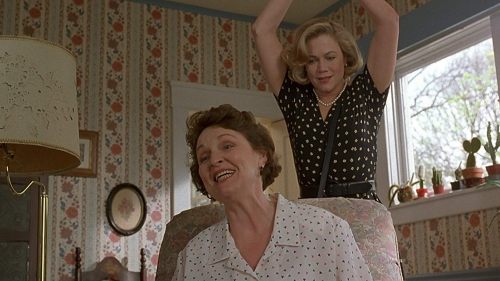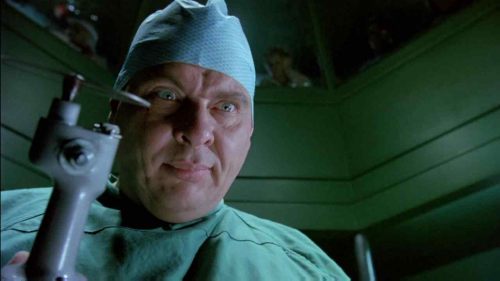Mink Stole Talks John Waters, SERIAL MOM and the Dreamland Players
Mink Stole is an icon – one of the great Dreamland Players who worked with John Waters in Multiple Maniacs, Pink Flamingos, Desperate Living and many other films. Along with Divine, David Lochary and Edith Massey, the Baltimore misfit became a counterculture midnight movie legend, bringing a bombastic style of acting that’s as captivating as it is shrill. In 2017, two of Waters’ milestone works – Multiple Maniacs and Serial Mom – are receiving much deserved deluxe Blu-ray treatments, so a whole new generation can discover the raunchy rewards of these true cult films.
We had a chance to speak with Mink in order to celebrate the upcoming release of Serial Mom, and what followed was a super fun, upbeat discussion regarding the glory days working with Dreamland, and which roles of hers she considers underappreciated…
BMD: Walk me through your first meeting with John Waters.
Mink Stole: Well, I met John in Provincetown, Massachusetts. I was with my sister, and she’d become acquainted with him in Baltimore. At the time, he’d only made one ten-minute 8mm black and white short film [Hag in a Black Leather Jacket]. He wasn’t a famous person yet. But there was no denying even back then that he was a special person. He had this long, stringy hair and yellow aviator sunglass, and just enormous eyes. He was very confident and self-assured and just so knowledgeable about pop culture in a way that was different from anyone I’d ever met. I was instantly attracted to him.
We became quick friends, and me, my sister and a few friends began sharing this enormous apartment with John. That winter, when we came back to Baltimore, he called me up and said “hey, I’m making this movie, you wanna be in it?” Of course, I said “yes”, but our relationship was accidental and casual at first. He just came over and picked me up, and we shot some scenes. We began working together without either of us really knowing what the hell we were doing.
John made a couple of short films that I was not a part of for various reasons. Then he made Mondo Trasho, and asked me to be in that. I don’t know if you’ve seen that one, but it involved me doing all sorts of wonderful things, like getting locked in the trunk of a car while wearing a strait jacket, and dancing topless in a tutu inside of what’s supposed to be a mental institution. Then I get assaulted by one of the inmates. It was just a wonderful time, really. [laughs] But he would ask me to do it, and I’d say “yes”. We got along as friends, and I gave him what he wanted to see on screen. It was a wonderful, symbiotic relationship.
BMD: It’s always cool to watch the earlier movies you guys made together. They did a retrospective here in Austin two years ago where I got to see Multiple Maniacs, Pink Flamingos, Desperate Living and Polyester with a rowdy audience.
MS: Oh my God, I had no idea!
BMD: They even had the Smell-O-Vision cards for Polyester! The one programmer here [Weird Wednesday’s Laird Jimenez] put on quite the show.
MS: I can’t believe there are still places showing these movies that way!
BMD: Watching them back-to-back, I noticed each of the so-called Dreamland Players had something of a defined role. Yours was constantly being a foil for Divine. How did you earn that designation?
MS: You know, I have no idea. You’d have to ask John. That was never my choice. If it were up to me, I’d have always been the winner, instead of always being the loser. If it were up to me, I would’ve been able to kill Divine.
To be honest, we didn’t always know how the movies were going to end when we got started, but I always knew that I wasn’t going to come out the winner. And that was fine, even though it would’ve been cool to convict her of being an asshole and shoot her in that big red dress.
BMD: With Serial Mom and Multiple Maniacs being re-released on these rather lavish new editions, there seems to be a movement toward getting these movies in front of a new audience. Why do you think now is the right time for people to rediscover them?
MS: John is always trying to get things done – the man has the energy of seven people. He’s always trying to get more mileage out of anything we’ve done. I’m personally thrilled that these movies are getting a second life. My hope is that there would be enough interest in these re-releases that someone out there would go ”let’s let this man make another one.” To me, that would be the greatest outcome.
What’s amazing about these two movies coming back at the same time is the contrast between them. Multiple Maniacs was the very first movie John made with a sync’d soundtrack. It was shot on 16mm black and white, and the crudeness of the filmmaking is rather obvious. It doesn’t detract from it, mind you, it’s just there. But then you have Serial Mom – that’s so crisp, and so well made. It’s a beautiful film, but it’s fascinating to see just how far John came in terms of sheer filmmaking skill.
BMD: Was there any difference to the way you approached making these movies when the budgets increased? Or was there always a sense of creative “family” on set?
MS: We were all on a learning curve. With Multiple Maniacs, I was encouraged to do every scene in very broad strokes, and that was the same with a lot of the earlier films. Very broad strokes are what we were all working within. With Serial Mom, John was telling me to tone it down, which was new to me. Even as recently as Hairspray, he hadn’t brought up subtlety or nuance at all. We were just loud all the time. It was a whole new way of acting for me. But John had learned a great deal, and I had learned a great deal. And God knows, Kathleen [Turner] was experienced, and Sam [Waterson] was experienced, so they knew exactly how to behave on film. I’m not going to say they were more “talented”, but they were certainly people who knew how to come in and do the work. It was a pleasure to work with them.
BMD: Serial Mom is certainly the least “loud” movie you guys made together up to that point.
MS: It’s the subtlest, without a doubt. I think it’s the best movie he’s ever made. There’s not an extra word or extra moment. Unlike Pink Flamingos, where there are quite a few unnecessary words.
BMD: Your reputation as an actress was cemented during an era where midnight movies existed in their purest forms. Do you think those types of movies can exist and thrive in today’s cinematic landscape?
MS: Times change. Great acting, or even different types of acting, moves into different areas of entertainment. Today, a lot of the great, interesting [acting] has moved onto television, which also costs a lot. You know, anyone with a video camera and dollar can make a movie today, but that doesn’t mean that it’s going to be a good movie. It doesn’t mean it will get distribution. Things move differently now, and I’m afraid I don’t really have a great answer for that question.
BMD: That’s fine. It’s a tough question that I consider a bunch, as I spend more time watching movies from that era than I do television.
But how would you like you career to be viewed when people look back on it?
MS: I would like to be thought of as a good actress. [laughs] You know, it sounds simple, but it’s true. The unfortunate flipside of working with John – and it’s nobody’s fault but our own – is that no matter what I do, I’m always going to be compared to myself as a “John Waters actor”. Even if I do Tennessee Williams or Shakespeare; and I’ve done Tennessee Williams and Shakespeare! John won’t be involved in [a project] in any way, but his name will still come up in the review. I find that to be a little disconcerting, because sometimes his name comes up before mine. It’s not “Mink Stole, who occasionally acts for John Waters” but “John Waters’ actor, Mink Stole”. He didn’t invent me! He didn’t create me! But that’s how it’s written. So, I would like to just be thought of as “an actor” instead of “a John Waters actor”. Yet that has nothing to do with his films, because I’m very proud of my work in them.
BMD: And you should be! The opening ten minutes of Desperate Living where you completely melt down is one of the great moments in screen acting history.
MS: Thank you! I had a great time on that set. It was fun.
BMD: What’s a role you’ve done that you think is undervalued?
MS: I did this Tennessee Williams play called The Mutilated. It’s about a woman who has one of her breasts removed, which was a big deal during the '60s, because people didn’t talk about women’s health the way they do now. I did it in New York and New Orleans, all over. And I kicked ass in it.
As far as the film roles, I’ve enjoyed every movie I’ve made while on set, but Taffy Davenport in Female Trouble and Dottie Hinkle in Serial Mom are my favorites. They very specific and I’m very, very proud of them.
Serial Mom will be released on Blu-ray May 9, courtesy of Scream Factory.



